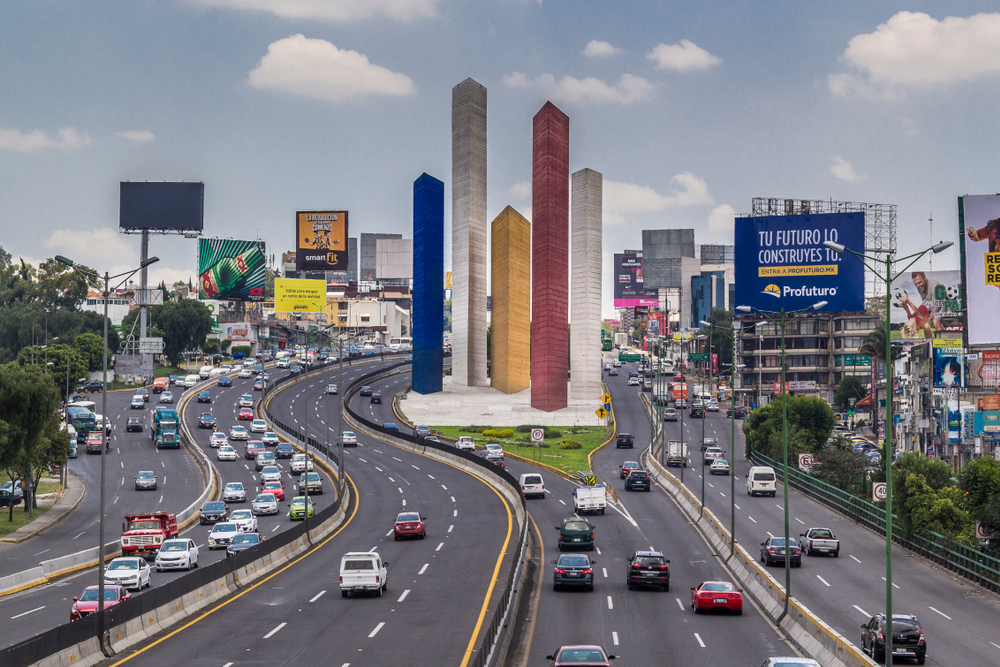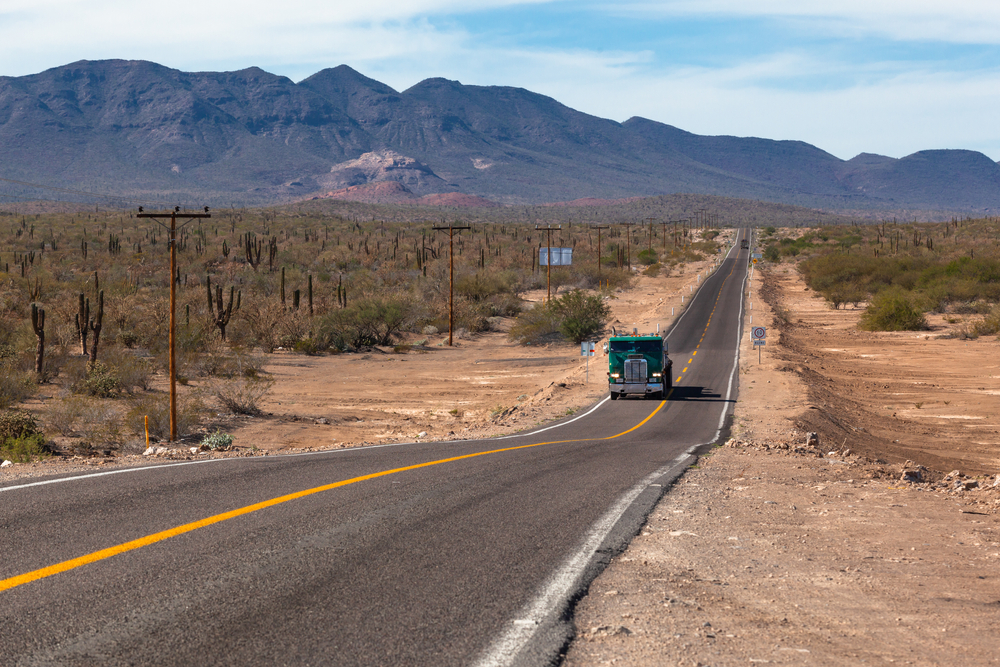Driving and Autos: Driving Conditions
The information below has been excerpted from the following: 1) the US Department of State's "International Travel" website (travel.state.gov/travel/), 2) the Australian Department of Foreign Affairs and Trade's "Smartraveller" website (www.smartraveller.gov.au), and 3) the UK Foreign and Commonwealth Office's "Foreign Travel Advice" website (www.gov.uk/foreign-travel-advice/). Additional information is available from these sources. World Trade Press annually assesses the information presented on this page.
United States: Department of State International Travel Information
Continued concerns regarding criminal activity on highways along the Mexican border (which includes placement of illegal checkpoints and the murder of persons who did not stop and/or surrender their vehicles) have prompted the U.S. Mission in Mexico to impose certain restrictions on U.S. government employees transiting the area. Effective July 15, 2010, Mission employees and their families may not travel by vehicle across the U.S.-Mexico border to or from any post in the interior of Mexico. This policy also applies to employees and their families transiting Mexico to and from Central American posts. This policy does not apply to employees and their family members assigned to border posts (Tijuana, Nogales, Ciudad Juarez, Nuevo Laredo, and Matamoros), although they may not drive to interior posts as outlined above. Travel is permitted between Hermosillo and Nogales, but not permitted from Hermosillo to any other interior posts.
While in a foreign country, U.S. citizens may encounter road conditions that differ significantly from those in the United States. The information below concerning Mexico is provided for general reference only, and may not be totally accurate in a particular location or circumstance. Public transportation vehicles, specifically taxis and city buses, often do not comply with traffic regulations, including observing speed limits and stopping at red lights.
Driving and Vehicle Regulations
U.S. driver's licenses are valid in Mexico. Mexican law requires that only owners drive their vehicles, or that the owner be inside the vehicle. If not, the vehicle may be seized by Mexican customs and will not be returned under any circumstances. The Government of Mexico strictly regulates the entry of vehicles into Mexico. Traffic laws in Mexico are sporadically enforced and therefore often ignored by drivers, creating dangerous conditions for drivers and pedestrians. Driving under the influence of alcohol is illegal in all parts of Mexico. Using a mobile device (such as a cell phone) is also prohibited while driving in many parts of Mexico, including Mexico City, and violators may be fined.
Insurance
Mexican insurance is required for all vehicles, including rental vehicles. Mexican auto insurance is sold in most cities and towns on both sides of the border. U.S. automobile liability insurance is not valid in Mexico, nor is most collision and comprehensive coverage issued by U.S. companies. Motor vehicle insurance is considered invalid in Mexico if the driver is found to be under the influence of alcohol or drugs.
Road Emergencies and Automobile Accidents
Motor vehicle accidents are a leading cause of death of U.S. citizens in Mexico. Motorists should exercise caution and remain alert on all Mexican roads. If you have an emergency while driving, the equivalent of “911” in Mexico is “066”, but this number is not always answered. If you are driving on a toll highway (or “cuota”), or any other major highway, you may contact the Green Angels (Angeles Verdes), a fleet of trucks with bilingual crews. The Green Angels may be reached directly at (01) (55) 5250-8221. If you are unable to call them, pull off to the side of the road and lift the hood of your car; chances are that they will find you.
If you are involved in an automobile accident, you may be taken into police custody until it can be determined who is liable and whether you have the ability to pay any penalty. If you do not have Mexican liability insurance, you may be prevented from departing the country even if you require life-saving medical care, and you are almost certain to spend some time in jail until all parties are satisfied that responsibility has been assigned and adequate financial satisfaction received. Drivers may face criminal charges if injuries or damages are serious.
Road Safety
Avoid driving on Mexican highways at night. Even multi-lane expressways in Mexico often have narrow lanes and steep shoulders. Single-vehicle rollover accidents involving U.S. citizens are common, often resulting in death or serious injury to vehicle occupants. Use extreme caution when approaching towns, driving on curves, and passing large trucks. All vehicle occupants should use seatbelts at all times. Criminal assaults have occurred on highways throughout Mexico; travelers should exercise extreme caution at all times and should use toll (“cuota”) roads rather than the less secure “free” (“libre”) roads whenever possible. Always keep car doors locked and windows up while driving, whether on the highway or in town. While in heavy traffic, or stopped in traffic, leave enough room between vehicles to maneuver and escape, if necessary. In addition, U.S. citizens should not hitchhike or accept rides from or offer rides to strangers anywhere in Mexico. Please refer to our Road Safety Overseas for more information.
Vehicular traffic in Mexico City is restricted in order to reduce air pollution. The restriction is based on the last digit of the vehicle license plate. This applies equally to permanent, temporary, and foreign (U.S.) plates. For additional information, refer to the Hoy No Circula website (Spanish only) maintained by the Mexico City government.
In recent years, moped rentals have become very widespread in Cancun and Cozumel, and the number of serious moped accidents has risen accordingly. Most operators carry no insurance and do not conduct safety checks. The U.S. Embassy recommends avoiding operators who do not provide a helmet with the rental. Some operators have been known to demand fees many times in excess of damages caused to the vehicles, even if renters have purchased insurance in advance. Vacationers at other beach resorts have encountered similar problems after accidents involving rented jet-skis. There have been cases of mobs gathering to prevent tourists from departing the scene and to intimidate them into paying exorbitant damage claims.
For additional information in English concerning Mexican driver’s permits, vehicle inspection, road tax, mandatory insurance, etc., please telephone the Mexican Secretariat of Tourism (SECTUR) at 1-800-44-MEXICO (639-426). Travelers can also consult MexOnline for further information regarding vehicle inspection and importation procedures. For detailed information in Spanish only, visit Mexican Customs’ website Import ación Temporal de Vehículos (“Temporary Importation of Vehicles”). Travelers are advised to consult with the Mexican Embassy or the nearest Mexican consulate in the United States for additional, detailed information prior to entering Mexico. For travel information for the Baja California peninsula, you can also consult independent websites Travelto Baja or Discove r Baja California.
Australia: Department of Foreign Affairs and Trade Travel Advice
Driving on rural roads in Mexico is dangerous due to poor road conditions, the presence of livestock and pedestrians on roads, and inadequate street lighting and signage. Criminals have targeted vehicles. When driving always keep doors locked, windows closed and do not leave valuables in vehicles even when locked. When driving in towns and cities, ensure there is enough room between your vehicle and those around you in case you have to change direction quickly. For further advice, see our road travel page. There are strict rules regarding foreigners driving in Mexico especially in relation to the reporting of accidents and having a relevant insurance policy. If you intend to drive within Mexico, you should ensure that you are well-informed of these laws.
Visitors intending to travel to Mexico in an owned or rented vehicle should ensure they have all the appropriate permits to enter Mexico. Check with the nearest Mexican embassy or consulate prior to your travel.
The standards maintained by diving schools, dive operators and other adventure activity companies may not be high or comparable to those in Australia. Carefully check the operator's credentials beforehand and ensure that your insurance policy covers you for all activities that you undertake.
Standards maintained by search and rescue services may not be as high or comparable to those in Australia. These services may not be available in some locations.
Visitors to beaches on both the Pacific and Caribbean coasts of Mexico should follow the warning flags. Local undertows and currents may endanger even strong swimmers.
United Kingdom: Foreign and Commonwealth Office Foreign Travel Advice
You can drive in Mexico using a UK licence or an International Driving Permit. Driving standards are very different from the UK. Roads can be pot-holed. Be prepared to stop unexpectedly and beware of vehicles moving slowly, changing lane without indicating and going through red lights. Many local drivers don’t have any form of car insurance.
To reduce air pollution, Mexico City and some other parts of the country have introduced restrictions on driving. Cars may be forbidden from entering certain areas on particular days, based on their number plates. These regulations are strictly enforced and offenders face heavy fines and temporary confiscation of their vehicle. This only applies to older vehicles and not to newer models which are often used for car hire. Please double check with your car hire company directly.
There is an additional driving restriction in Mexico City, where vehicles without registration plates from the State of Mexico (Estado de Mexico) or the Federal District (DF) are not allowed to enter Mexico City from Monday to Friday between 5:00am and 11:00am.
You may come across unofficial roadblocks, including on main roads, manned by local groups seeking money for an unofficial local toll.
Copyright © 1993—2024 World Trade Press. All rights reserved.

 Mexico
Mexico 
